当前城市:淄博[切换]
- 手机雅思无忧

扫码登录
雅思考试主要是通过对考生听、说、读、写四个方面英语能力的考核,综合测评考生的英语沟通运用能力,实现“沟通为本”的考试理念。对于雅思考生来说,也有很多考试难点和政策盲区需要帮助解答。今天雅思无忧网小编准备了雅思写作口语技巧:虚拟语气的使用(一) 口语如何才能考7分,希望通过文章来解决雅思考生这方面的疑难问题,敬请关注。
在雅思考试的主观项(写作和口语)中,能够成功区分现实和虚拟语气的小烤鸭就能牛逼哄哄地抢分,考官加分是毫不犹豫的!因此,虚拟语气是烤鸭从6到7飞跃的语法采分点,想7分的烤鸭必学!
雅思写作口语技巧:虚拟语气
用在动词wish之后
在动词wish后的宾语从句中,从句动词用过去时表示与现在事实相反的愿望;从句动词用过去完成时表示与过去事实相反的愿望;
从句中用 “would/could+动词原形”则表示将来难以实现的愿望。
I wish I knew how to operate the machine.
我要是会操作这台机器该多好啊。
We wish you had come to our English evening.
我们真希望你来参加了我们的英语晚会。
I wish I would try again.我真希望能再试一次。
注意:wish与hope的区别
wish后的宾语从句要用虚拟语气,而hope后的宾语从句要用陈述语气
I hope you'll be better soon.
我希望你能很快好起来。
用在would rather/would sooner后的宾语从句中
would rather和would sooner可以后接一个有自己的主语的宾语从句,从句内容是宁愿他人做什么或宁愿某物怎么样。
这种宾语从句中用过去时表示现在和将来的虚拟内容,用过去完成时表示过去的虚拟内容。
I wish I had seen you yesterday.
我希望昨天能见到你。
I'd rather you went home now.
我倒宁愿你现在回家。
I would rather you came tomorrow.
我倒宁愿你明天来。
I would rather you had stayed at home last night.
我倒宁愿你昨天晚上呆在家里。
用在表示命令、建议等意义的动词后的宾语从句中
在表示提议、要求、命令、意愿、决定等意义的动词
(如suggest, decide, require, request, demand, propose, insist, order, prefer等)
后的宾语从句中,常用 "should+动词原形",should常被省略。
The experiment has failed.
实验失败了。
I suggest you try again.
我建议你再试一次。
Almost all his friends suggested that he visit Mr. Johnson at once.
几乎他所有的朋友都建议他去拜访约翰逊先生。
Jane's pale face suggested that she was ill, and her parents suggested that she have a medical examination.
詹脸色苍白,表明她病了。她父母建议她做一次体格检查。
I insist that a doctor be sent for immediately.
我坚持立即请医生。
巧记10个虚拟动词
1、“一、二、三、四”法。
一个坚持,两个命令,
三个建议,四个要求。
一个“坚持(insist)”;
两个“命令(order,command)”;
三个“建议(suggest, propose, advise)”;
四个“要求(demand, require, request, ask)”。
2.“Discrop(无收获)”法。
由这个词的每一个字母联想一个词或两个词:demand,insist,suggest,command, request,require,order,propose。
3.用句联想法。
由句子“I drop cars”的每一个字母联想一个或两个动词:
insist,demand,request,order,propose,command,advise,ask ,require,suggest.
虚拟语气在主语从句中的用法
1、It +be+形容词+主语从句
“It +is +形容词+that引导的主语从句”句型,用动词原形或“should+动词原形”虚拟语气。常用于本句型的形容词有:
necessary, important, impossible等;还有与表示提议、要求、命令等动词同源的形容词词,
如 desirable(←desire), urgent(←urge), advisable(←advise), preferable(←prefer)等。
It is necessary that he listen to the radio frequently.
她很有必要常听收音机。
It is strange that he (should) have so many friends.
真奇怪,他居然有这么多的朋友。
2、It+be+过去分词+主语从句
“It +is +过去分词+that引导的主语从句”,可用“(should) +动词原形”。
常用于这一句型的过去分词有:suggested, required, requested, demanded, urged, ordered, proposed, desired, advised, etc.
It is ordered that we (should) go at once.
命令我们立刻出发。
It has been decided that the meeting (should) be put off.
已决定推迟会议。
网友kj1205:I have had the ielts test in 11/10/2003,but my speaking is just 6.I plan to have another try on April24,how can I get 7 during these day's preparation?Thanks a lot!
John:Well, it's taken me longer to respond to this post than I intended. Thanks for waiting! :)
It seems to me that there are two different questions being asked here. The first is about the actual difference between a Band Six and a Band Seven score; the second is about what one should do to improve from a Band Six to a Band Seven. These questions are obviously related; understanding the first one can help you understand the second. Also, these questions are both ones that many students are concerned about, so I've taken some time in formulating my reply.
Let's start with the first question: What is the difference between a Band Six score and a Band Seven score on the IELTS Speaking Test?
It's instructive to start off by taking a look at the official definitions of a Band Six score and a Band Seven score, which can be found on the official IELTS site (a great resource, by the way):
----------
7 Good User
Has operational command of the language, though with occasional inaccuracies, inappropriacies and misunderstandings in some situations. Generally handles complex language well and understands detailed reasoning.
6 Competent User
Has generally effective command of the language despite some inaccuracies, inappropriacies and misunderstandings. Can use and understand fairly complex language, particularly in familiar situations.
(source: http://www.ielts.org/format.htm)
----------
It helps to look at these official definitions because, while they are not specific to the speaking exam, they represent the most authoritative description of what the different band scores mean.
Let's now take a look at the specific differences between a Six and a Seven, as outlined in the definitions. We can break it down to three differences:
1. While a Seven has "an operational command of the language", a Six has merely "generally effective command of the language".
2. While a Seven will have "occasional inaccuracies, inappropriacies and misunderstandings", a Six will have "some inaccuracies, inappropriacies and misunderstandings".
3. While a Seven "Generally handles complex language well and understands detailed reasoning", a Six can "use and understand fairly complex language, particularly in familiar situations".
Of course, breaking it down like that is still a little complicated and vague, so let's summarize what these differences mean for the speaking test:
以上就是雅思无忧网为您准备的访问雅思无忧网(https://www.yasi.cn/),了解更多雅思考试新消息,新动态。
雅思培训 雅思写作技巧
雅思写作技巧
一些考生在备考雅思写作时,经常因为没有思路而不知道只能怎么写,那么小编给大家介绍一下关于雅思写作的技
2021年05月26日 13:26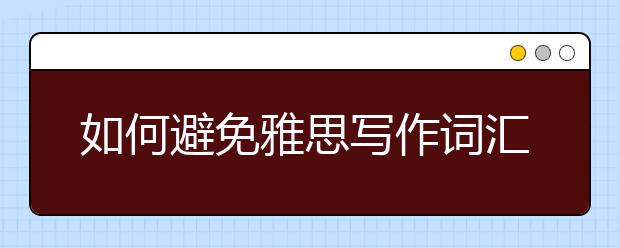 如何避免雅思写作词汇和语句的重复
如何避免雅思写作词汇和语句的重复
雅思作文由两块构成:大作文和小作文。通过观察评分标准,官方对词汇以及句式的考察都有所涉及,分别是LR
2021年05月26日 13:28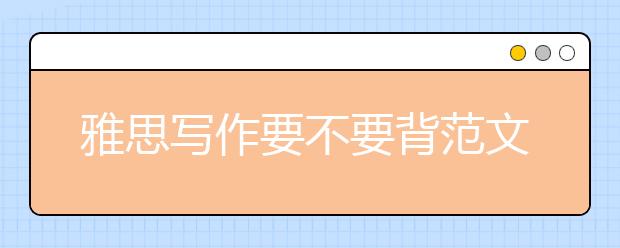 雅思写作要不要背范文?当你在背范文的时候你在背什么?
雅思写作要不要背范文?当你在背范文的时候你在背什么?
很多烤鸭都有这个疑问:“我要背范文吗?”“老师,多给点实用范文,让我能确保6分。”由于每个人英语水平
2021年05月28日 06:38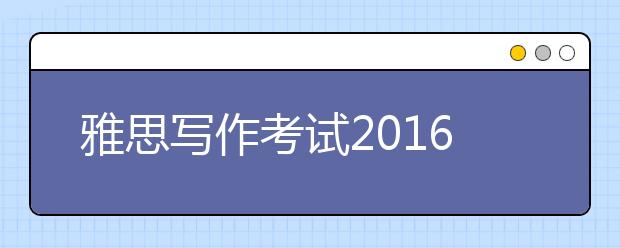 雅思写作考试2019最新评分标准细则讲解
雅思写作考试2019最新评分标准细则讲解
雅思写作的评分标准很简洁而直观,4大标准中,2个是语言层面的,分别是词汇和语法,2个是思维层面的,分
2021年05月29日 06:18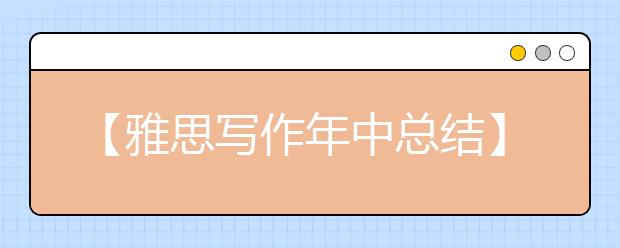 【雅思写作年中总结】2019年上半年雅思大作文考情综述
【雅思写作年中总结】2019年上半年雅思大作文考情综述
在2019年1-7月的雅思大作文考试中,各类大作文出现的规律与往年相似,主要仍旧以社会类和教育类为主
2021年05月29日 10:23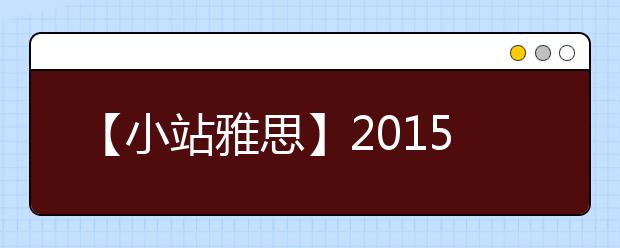 【小站雅思】2019年下半年雅思写作趋势分析
【小站雅思】2019年下半年雅思写作趋势分析
由于2019上半年雅思写作部分在题型方面有比较明显的侧重点,因此预计下半年在题型方面依然将出现重点考
2021年05月29日 11:14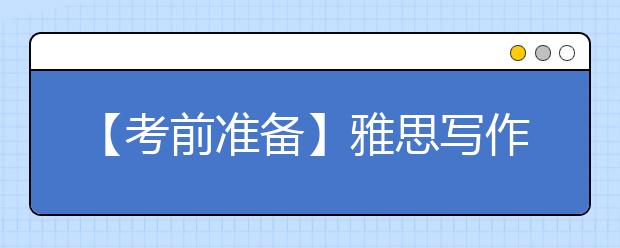 【考前准备】雅思写作考试考前一天要做的准备工作
【考前准备】雅思写作考试考前一天要做的准备工作
1、选择没有把握的题目,攻克难关:因为时间比较紧,再大量练习已经来不及了。要做的最重要的工作是让自己
2021年05月30日 03:02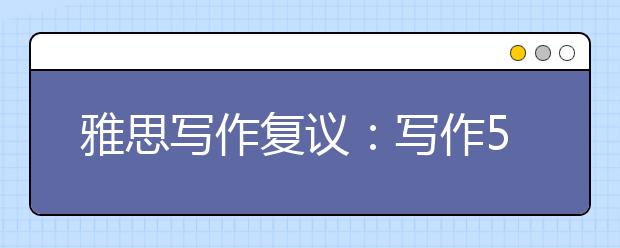 雅思写作复议:写作5.5提升至6.5(附复议技巧)
雅思写作复议:写作5.5提升至6.5(附复议技巧)
看到分数的那一刻心凉了半截,雅思写作分数居然只有5.5分。我傻了眼,虽然总分过了7,但是单项没过6我
2021年05月30日 03:27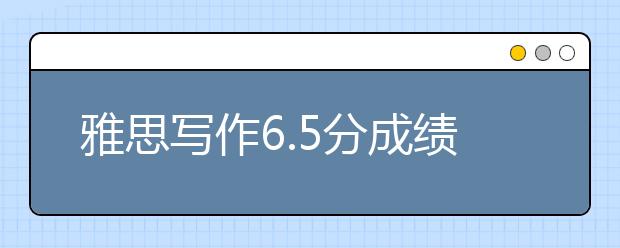 雅思写作6.5分成绩怎么样?
雅思写作6.5分成绩怎么样?
刚开始备考雅思的考生对雅思考试不了解,不知道什么分数时什么水平,今天七分雅思网为大家介绍一下雅思写作
2021年06月19日 09:24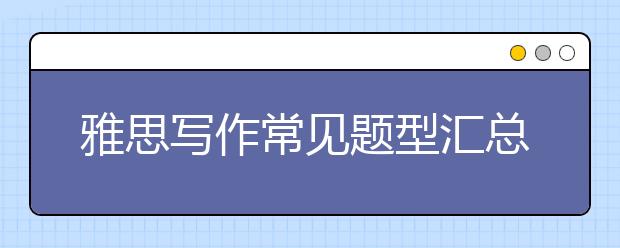 雅思写作常见题型汇总
雅思写作常见题型汇总
雅思考试中,雅思写作常见题型有哪些?一、教育类A.理论与实践1.知识和经验的重要性。2.为什么要上大
2021年06月01日 16:34